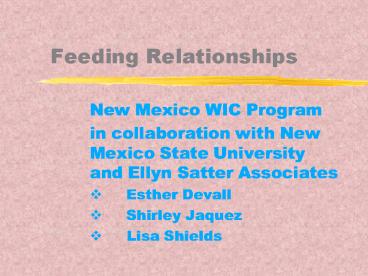Feeding Relationships - PowerPoint PPT Presentation
1 / 33
Title:
Feeding Relationships
Description:
They don't eat a square meal. They eat what tastes good. Equation for a Good Diet ... Have regular meals and snacks. Make eating time pleasant. Provide mastery ... – PowerPoint PPT presentation
Number of Views:37
Avg rating:3.0/5.0
Title: Feeding Relationships
1
Feeding Relationships
- New Mexico WIC Program
- in collaboration with New Mexico State University
and Ellyn Satter Associates - Esther Devall
- Shirley Jaquez
- Lisa Shields
2
Feeding is a Metaphor
- For parent-child relationship.
- For family functioning.
3
Levels of Intervention
- Primary
- Secondary
- Tertiary
4
Primary Intervention
- Teach positive feeding.
- Detect risk.
- Provide anticipatory
- guidance.
- Support parents.
5
Further Interventions
- Secondary - WIC nutritionists with
additional training. - Tertiary - referral to therapists
in community.
6
Issues in Feeding Children
- Food Selection.
- Feeding Relationship.
7
The Issue in Feeding Children is Trust
- Children are internally regulated.
- Require trust to regulate.
- Ignoring their needs interferes with
- internal regulation.
- Ignoring their needs undermines their self-
- esteem.
8
Regulation Process
- INTERNAL
- Hunger
- Appetite
- Satiety
- EXTERNAL
- Calories
- Food
- Shoulds
9
Children Are Erratic With Eating
- Food acceptance varies.
- Accept/reject food unpredictably.
- The amount they eat varies.
- They dont eat a square meal.
- They eat what tastes good.
10
Equation for a Good Diet
- Well Balanced Meals Snacks
- Positive Eating Environment
- __________________________
- Well Nourished Child
11
Division of Responsibility
- Parent What
- Infant How Much and Whether
- Parent What, When, and Where
- Toddler How Much and Whether
12
Parents Tasks
- Choose and prepare food.
- Have regular meals and snacks.
- Make eating time pleasant.
- Provide mastery expectations.
13
Childrens Eating Capabilities
- Children will eat when
- hungry.
- They know how much to
- eat.
- They will eat a variety of
- foods.
- They will grow predictably.
- They will mature with
- eating.
14
Developmental Stages
- Homeostasis Birth to 3 months.
- Attachment - 3 to 6 months.
- Separation-Individuation - 6 months to 3
- years.
- Initiative - 3 to 5 years.
15
Developmental Stage
- Homeostasis (Birth 3 months)
16
Parents Tasks in Homeostasis
- Calm and organize.
- Respond to infant cues.
17
Developmental Stage
- Attachment (3 6 months)
18
Parents Tasks in Attachment
- Maintain reciprocity.
- Engage child.
- Modulate arousal.
19
Developmental Stage
- SeparationIndividuation (6 months 3 years)
20
Parents Tasks in Separation-Individuation
- Provide opportunities to explore.
- Support autonomy.
- Provide structure.
- Set limits.
21
Developmental Stage
- Initiative (3 5 years)
22
Parents Tasks in Initiative
- Make maturity demands.
- Have realistic expectations.
- Remain present and available.
- Support without intruding.
23
Feeding Periods
- Early Infancy - Nipple feeding.
- Late Infancy - Transition to solids.
- Toddler - Modified adult foods.
24
Eating Skills in Early Infancy
- Roots for nipple.
- Sucks.
- Swallows.
25
Eating Skills in Middle Infancy
- Begins sitting.
- Follows food with eyes.
- Lips close over spoon.
- Moves semi-solids to
- back of tongue.
- Swallows semi-solids.
26
Eating Skills in Late Infancy
- Tongue moves food to side of mouth.
- Positions food In mouth.
- Delays swallow.
- Munches.
- Palms food.
- Scrapes food into mouth.
27
Eating Skills in Toddler Preschool
Years
- Chews.
- Moves food around in mouth.
- No pause in side-to-side transfer.
- Begins to use utensils.
28
Child Characteristics That Risk Feeding
- Difficult temperament.
- At risk or very small.
- Eats very large or very small amounts.
- Illness.
- Prematurely born.
- Physical or cognitive limitations.
- Requires a modified diet.
29
Parent Characteristics That Risk Feeding
- Over-active, too stimulating.
- Under-active, not engaging.
- Chaotic or disorganized.
- Rigid or over-controlling.
- Over-concerned about childs food selection or
weight. - Under-concerned about childs food selection or
weight. - Has a particular agenda for growth.
30
Factors In Growth
- Medical.
- Psychosocial.
- Feeding Relationship.
- Nutritional.
31
Growth Patterns
- Normative
- Consistent
- Smooth
- Gradual changes
- Divergent
- Unpredictable
- Uneven
- Dramatic changes
32
Feeding Relationships in WIC Clinics
- Certification
- Risk factor.
- Nutrition goal.
- One-on-One counseling.
- Nutrition Education
- Facilitated discussions.
- Additional Counseling
- Primary or secondary intervention.
33
Concept Map of Feeding Relationships
Division of Responsibility
Childs Responsibility
Parents Responsibility
Infant What Child What, When, Where
Infant How Much Whether Child How Much
Whether































